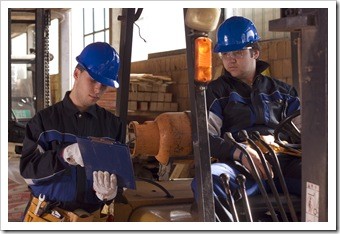
What is Ergonomics?
Ergonomics is the practice of suiting the conditions in which a person works to the specific capabilities and job demands of that employee. It follows that, for an ergonomic workplace to be created, a proper assessment of the environment must first of all take place so that appropriate changes can be made on the basis of accepted ergonomic principles. The aim is to create a safer and more productive working environment for the employee. If that sounds like so much politically correct gobbledygook, it’s not; it actually makes perfect sense. The gist is this: if Mini-Me came to work at your place of employment, you’d have to make his workstation user-friendly for him. (You’d also have to clear a space on the bottom shelf of the fridge in the staff kitchen for his packed lunch.)
Three basic principles apply above all others when dealing with workplace ergonomics:
- The stress of any lifting should be taken by the largest muscles to protect the smaller and more vulnerable ones.
- When working, the employee should be able to move comfortably between various correct postures so they don’t overstress one particular part of the body for an extended period. Muscles become fatigued when kept tense for too long, especially if that one posture is poor.
- Joints should move through no more than 50% of their range when performing activities, and preferably be kept in a neutral position. Joints that are overextended can become damaged and susceptible to repetitive stress/strain injuries.
Advice for the desk-bound worker:
- The height of the desk should be suited to your frame, and everything you need should be within easy reach.
- Your feet should be able to touch the floor, and the angle between your torso and thighs should be 90 to 110 degrees.
- Keep your body straight, head and neck upright, and keep your task directly in front of you. Don’t hunch or slouch.
- The top of your computer monitor should be at your eye level. Your head should be in a neutral position, otherwise any leaning forward can cause pain in the neck and head.
- Your wrists should be straight when typing, and your shoulders and forearms parallel to the floor.
- Anything you read at your desk should be at the same level as though you were reading it on your monitor. Use a book stand or a paper holder.
- Use a headset when talking on the telephone – certainly if you are doing so for long periods. Never use your shoulder to cradle the phone against your ear. This will lead to headaches and neck pain, although you will be first in line to ring the bells at Notre Dame.
- Every 20 or 30 minutes, get up, have a stretch and go for a little wander. This is much more enjoyable if there is a bar next door.
- Frequently stretch out your neck, arms, wrists, back, and legs while working. Try neck rotations, fist clenches, arm dangles, and shoulder shrugs. Try not to make the last one look like you don’t really care about your work.
- Don’t stare at one thing for too long. If your eyes do not frequently shift focus, they will become strained. Take a few seconds to look from objects that are nearby to objects that are farther away, such as your colleagues who are still frowning at you following your last stretching routine.
Mouse safely:
Use you arm and shoulder to move the mouse, not just your wrist. Hold the mouse loosely and keep your wrist straight and relaxed. The edge of your desk is not the best place to rest your wrist; instead, use a gel rest incorporated into the mouse mat. Take regular breaks during each hour to flex your wrists, and to move your arms and shoulders.
Safe lifting advice:
When lifting anything off the floor, bend at the knees, not at the waist. Keep your head up, your neck and back straight, and use your leg muscles to power up to standing. Bending forward at the waist to lift brings your low-back muscles into it, and these can be easily pulled. Keep your elbows flexed and hold the object close in to your body to further minimize back strain. Then give Mini-Me a peck on the head and set him back down.
For Your Health,
Dr. Frederick Savard

